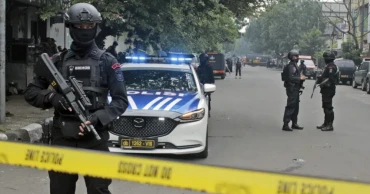Bombing
Thai police detain 2 over border bombing that killed 3
Thai police on Saturday said two suspects were in custody as authorities investigated a bombing in the north that killed at least three people and injured dozens of others.
An explosive device was thrown into a crowd during an outdoor performance at an annual festival in Umphang town in Tak province, which borders Myanmar, on Friday just before midnight, according to the Association of the Umphang Rescue Groups.
Local police said at least 48 people were injured and that police have not yet pressed charges against the suspects as the investigation is ongoing.
Thanathip Sawangsang, a spokesperson for the Defense Ministry, told The Associated Press that local police said there was a fight between rival groups of men before the explosion and that there was no wider security threat. He said the forensic evidence showed that the explosive device was a homemade bomb.
South Korean lawmakers to vote on Impeachment of President Yoon over martial law decree
Tak province has a heavy military presence in its border areas, including in Umphang.
Prime Minister Paetongtarn Shinawatra expressed her condolences to the victims and their families, and ordered security personnel and relevant agencies in the area to investigate and help those who have been affected, said government spokesperson Jirayu Houngsap.
1 year ago
Suicide bombing in southwestern Pakistan kills 10 policemen
A suicide bomber riding on a motorcycle rammed into a police truck in Pakistan's restive southwest, killing at least 10 policemen and wounding 12 officers in one of the deadliest attacks on security forces in recent months, authorities said.
No one immediately claimed responsibility for the bombing, which took place on a bridge in the district of Sibi in Baluchistan province, but Baluch separatists and local militants have been blamed for previous such attacks.
Mahmood Notenzai, a local police chief, said the officers were on a routine patrol when the attack happened, initially killing nine. The casualties were taken to a nearby hospital, where one of the critically wounded policemen later died, he added. Sibi is about 150 kilometers (90 miles) east of Quetta, the provincial capital.
Notenzai said the officers who came under attack were deployed last week to Sibi, where an annual cultural festival was held amid tight security. An army helicopter was sent to evacuate the seriously wounded to a hospital in Quetta, where better health facilities are available.
Last year, a suicide bomber from the extremist Islamic State group targeted President Arif Alvi 's security convoy when he attended the Sibi festival. Alvi was far away from the site of the bombing, which killed five troops. IS militants later claimed responsibility for that attack.
The festival has been celebrated for several centuries to mark the advent of summer.
Prime Minister Shahbaz Sharif condemned the attack. In a statement, he expressed his condolences to the families of those killed and ordered health officials to provide the best medical care for the wounded policemen. He said the attack was part of nefarious enemy plans to destabilize Pakistan and vowed to defeat terrorism.
Abdul Qudoos Bizenjo, the top elected official in Baluchistan, also denounced the bombing.
“The terrorists who are carrying out such attacks are the enemy of Pakistan,” he said, adding that they will not shake the resolve of the country's police.
Baluchistan has long struggled with a low-level insurgency by the Baluchistan Liberation Army and other small separatist groups demanding independence from the central government in Islamabad.
Authorities claim to have quelled the insurgency but violence has persisted. The province has also seen attacks by militants from both the Pakistani Taliban and the Islamic State group.
2 years ago
Suicide bomber kills 59, wounds over 150 at Pakistan mosque
A suicide bomber struck a crowded mosque inside a police compound in Pakistan on Monday, causing the roof to collapse and killing at least 59 people and wounding more than 150 others, officials said.
Most of the casualties were police officers. It was not clear how the bomber was able to slip into the walled compound, which houses the police headquarters in the northwestern city of Peshawar and is itself located in a high-security zone with other government buildings.
Sarbakaf Mohmand, a commander for the Pakistani Taliban, claimed responsibility for the attack on Twitter. The main spokesman for the militant group was not immediately available for comment.
"The sheer scale of the human tragedy is unimaginable. This is no less than an attack on Pakistan,” tweeted Prime Minister Shahbaz Sharif, who visited the wounded in Peshawar and vowed “stern action” against those behind the bombing. He expressed his condolences to families of the victims, saying their pain ”cannot be described in words."
Pakistan, which is mostly Sunni Muslim, has seen a surge in militant attacks since November, when the Pakistani Taliban ended their cease-fire with government forces.
Earlier this month, in another attack claimed by the Pakistani Taliban, a gunman shot and killed two intelligence officers, including the director of the counterterrorism wing of the country’s military-based spy agency Inter-Services Intelligence. Security officials said Monday the gunman was traced and killed in a shootout in the northwest near the Afghan border.
Monday's assault on a Sunni mosque inside the police facility was one of the deadliest attacks on security forces in recent years.
The militant group, also known as Tehreek-e-Taliban Pakistan or TTP, is separate from but a close ally of the Afghan Taliban. The TTP has waged an insurgency in Pakistan in the past 15 years, seeking stricter enforcement of Islamic laws, the release of its members in government custody and a reduction in the Pakistani military presence in areas of Khyber Pakhtunkhwa province it has long used as its base.
More than 300 worshippers were praying in the mosque, with more approaching, when the bomber set off his explosives vest. Many were injured when the roof came down, according to Zafar Khan, a police officer, and rescuers had to remove mounds of debris to reach worshippers still trapped under the rubble.
Meena Gul, who was in the mosque when the bomb went off, said he doesn’t know how he survived unhurt. The 38-year-old police officer said he heard cries and screams after the blast.
Mohammad Asim, a spokesman at the main government hospital in Peshawar, put the death toll at 59, with 157 others wounded. Police official Siddique Khan the bomber blew himself up while among the worshippers.
Senior police and government officials attended the funerals of 30 police officers and arrangements to bury the rest were being made. Coffins were wrapped in the Pakistani flag their bodies were later handed over to relatives for burials.
Read more: Roadside bomb kills 6 people in north Afghanistan: Taliban
Peshawar is the capital of Khyber Pakhtunkhwa province, where the Pakistani Taliban have a strong presence, and the city has been the scene of frequent militant attacks.
The Afghan Taliban seized power in neighboring Afghanistan in August 2021 as U.S. and NATO troops pulled out of the country after 20 years of war.
The Pakistani government's truce with the TTP ended as the country was still contending with unprecedented flooding that killed 1,739 people, destroyed more than 2 million homes, and at one point submerged as much as a third of the country.
Mohmand, of the militant organization, said a fighter carried out the attack to avenge the killing of Abdul Wali, who was widely known as Omar Khalid Khurasani, and was killed in neighboring Afghanistan’s Paktika province in August 2022.
Afghanistan’s Foreign Ministry said in a statement that it was “saddened to learn that numerous people lost their lives and many others were injured by an explosion at a mosque in Peshawar” and condemned attacks on worshippers as contrary to the teachings of Islam.
Condemnations also came from the Saudi Embassy in Islamabad, as well as the U.S. Embassy, adding that "The United States stands with Pakistan in condemning all forms of terrorism.”
Cash-strapped Pakistan faces a severe economic crisis and is seeking a crucial installment of $1.1 billion from the International Monetary Fund — part of its $6 billion bailout package — to avoid default. Talks with the IMF on reviving the bailout have stalled in the past months.
Former Pakistani Prime Minister Imran Khan called the bombing a “terrorist suicide attack.” He tweeted: “My prayers & condolences go to victims families. It is imperative we improve our intelligence gathering & properly equip our police forces to combat the growing threat of terrorism.”
Sharif’s government came to power in April after Khan was ousted in a no-confidence vote in Parliament. Khan has since campaigned for early elections, claiming his ouster was illegal and part of a plot backed by the United States. Washington and Sharif dismiss Khan's claims.
3 years ago
Bombing derails passenger train in SW Pakistan, injures 15
A bomb planted by suspected militants derailed a passenger train in a remote area in southwestern Pakistan on Friday, injuring at least 15 people on board, officials said. A separatist group later claimed responsibility.
The train was passing through the district of Bolan in Baluchistan province when the bomb went off, according to a district administrator, Samiullah Agha.
The explosion was so powerful that it derailed eight train cars, Agha said. Rescuers transported the injured to a nearby hospital, and engineers were repairing the damaged rail tracks.
Some of the more seriously injured were moved to a military hospital in Quetta, the provincial capital in Baluchistan.
Read more: Suicide blast in southern Pakistan kills 3 Chinese, driver
Hours later, the separatist Baluchistan Liberation Army, which was designated a “terrorist” group by the United States in 2019, claimed responsibility for the attack.
Azad Baloch, a spokesman for the group, said their fighters targeted security forces traveling by train to the garrison city of Rawalpindi in eastern Punjab province.
Government and military officials did not immediately comment on the separatist group's claim.
For over a decade, Baluchistan has been the scene of a low-level insurgency by ethnic Baluch separatists seeking autonomy from the Islamabad government or outright independence
Pakistani militants also have a presence in the province, which borders both Afghanistan and Iran.
Read more: Suicide bombing kills 56 at Shiite mosque in Pakistan
3 years ago
Car bombing in Islamabad kills 2 suspects and policeman
A powerful car bomb detonated near a residential area in Islamabad on Friday, killing two suspected militants and an officer, police said, raising fears that militants have a presence in one of the country’s safest cities.
At least three police officers and seven passersby were wounded in the bombing.
Friday’s bombing in Pakistan’s capital city happened 15 kilometers ( about 9 miles) from the garrison city of Rawalpindi, home of the military and government spy agencies.
Police said in a statement that the blast happened when police officers spotted the car and ordered the driver to halt for routine checking. Instead of stopping, its driver detonated explosives hidden inside. A female passenger in the car also was killed, Suhail Zafar Chattha, a senior police officer in Islamabad told reporters at the scene.
TV footage showed a burning car as police officers cordoned off the area.
Residents said they saw policemen on motorcycles chasing a car and ordering a man inside the vehicle to come out.
Chattha, the city’s deputy police chief confirmed that account, saying the suspect blew up the explosive-laden vehicle after being surrounded by police officers.
Read: Bombing at Indonesian police station kills officer, hurts 7
Pakistani Prime Minister Shahbaz Sharif condemned the bombing and thanked the police.
“Police officers stopped the terrorists by sacrificing their blood and the nation salutes its brave men,” Sharif said in a statement.
No one claimed responsibility for the bombing. Pakistani Taliban have stepped up attacks on security forces since November, when they unilaterally ended a monthslong cease-fire with Pakistan’s government.
The violence comes days after several Pakistani Taliban detainees overpowered their guards at a counterterrorism center in northwestern Pakistan on Sunday after snatching police weapons and taking three officers hostage.
On Tuesday, Pakistan’s special forces raided the detention center, triggering an intense shootout in which the military later said 25 detainees linked to the Pakistani Taliban were killed in Bannu, a district in the Khyber Pakhtunkhwa province and part of a former tribal region.
Three troops and at least three hostages were killed in that incident.
Read: Turkey makes more arrests in connection with deadly bombing
The government has since stepped up security across the country, based on intelligence reports that the Pakistani Taliban, known as Tehreek-e-Taliban Pakistan or TTP, had dispatched fighters to carry out attacks at public places and police stations.
Pakistani Taliban are separate but allied with the Afghan Taliban, who seized power in neighboring Afghanistan last year as U.S. and NATO troops were in the final weeks of their pullout after 20 years of war. Since then, top TTP leaders and fighters have been hiding in neighboring Afghanistan, though the militants still have relatively free reign in patches of the province.
3 years ago
Bombing at Indonesian police station kills officer, hurts 7
A man blew himself up Wednesday at a police station on Indonesia’s main island of Java, killing an officer and wounding seven people, officials said, in what appeared to be the latest in a string of suicide attacks blamed on Muslim militants.
The attacker entered the Astana Anyar police station with a motorcycle and detonated explosives as police were lining up for a morning assembly, said Bandung city Police Chief Aswin Sipayung.
An officer died, six were wounded and were rushed to a hospital together with a civilian who was also hurt in the attack, said West Java Police spokesperson Ibrahim Tompo.
Read: 2 dead as bomber hits Pakistan police protecting polio teams
A video that circulated on social media showed body parts near the damaged lobby of the police station. Television reports showed white smoke billowing from the building and people running in panic following a loud bang.
Police were investigating if the attacker, who was not identified, had links to radical groups.
West Java Police Chief Suntana said the man brought two bombs but one apparently failed to explode and was defused.
Suntana, who goes by a single name, said that police found a paper taped to the perpetrator’s motorbike with the words, “Criminal code is the law of infidels, let’s fight the satanic law enforcers.”
Indonesia’s Parliament on Tuesday passed a new criminal code that bans sex outside of marriage and insulting the president and state institutions.
The current penal code is a Dutch colonial legacy. A revised code was poised for passage in 2019, but President Widodo urged lawmakers to delay a vote amid mounting public criticism that led to nationwide protests as opponents said it contained articles that discriminated against minorities and that the legislative process lacked transparency.
Read: Indonesian football match stampede: Death toll climbs to 174
Indonesia has battled militants since bombings on the resort island of Bali in 2002 killed 202 people, mostly foreign tourists. Attacks aimed at foreigners have largely been replaced in recent years with smaller, less deadly strikes targeting the government, police and anti-terrorism forces and people who militants consider infidels.
A similar attack occurred in 2019, when a suicide bomber blew himself up at a busy police station in Medan, Indonesia’s third-largest city, wounding at least six people.
In May 2018, two families carried out a series of suicide bombings on churches in the city of Surabaya, killing a dozen people including two young girls whose parents had involved them in one of the attacks. Police said the father was the leader of a local affiliate of Indonesian terrorist group Jemaah Anshorut Daulah.
Last year, two attackers believed to be members of a militant network that pledged allegiance to the Islamic State group blew themselves up outside a packed Roman Catholic cathedral during a Palm Sunday Mass on Indonesia’s Sulawesi island, killing the two attackers and wounding at least 20 people.
3 years ago
Bombed, not beaten: Ukraine’s capital flips to survival mode
Residents of Ukraine’s bombed capital clutched empty bottles in search of water and crowded into cafés for power and warmth Thursday, switching defiantly into survival mode after new Russian missile strikes a day earlier plunged the city and much of the country into the dark.
In scenes hard to believe in a sophisticated city of 3 million, some Kyiv residents resorted to collecting rainwater from drainpipes, as repair teams labored to reconnect supplies.
Friends and family members exchanged messages to find out who had electricity and water back. Some had one but not the other. The previous day’s aerial onslaught on Ukraine’s power grid left many with neither.
Cafés in Kyiv that by some small miracle had both quickly became oases of comfort on Thursday.
Oleksiy Rashchupkin, a 39-year-old investment banker, awoke to find that water had been reconnected to his third-floor flat but power had not. His freezer thawed in the blackout, leaving a puddle on his floor.
So he hopped into a cab and crossed the Dnieper River from left bank to right, to a café that he’d noticed had stayed open after previous Russian strikes. Sure enough, it was serving hot drinks, hot food and the music and Wi-Fi were on.
“I’m here because there is heating, coffee and light,” he said. “Here is life.”
Kyiv Mayor Vitali Klitschko said about 70% of the Ukrainian capital was still without power on Thursday morning.
As Kyiv and other cities picked themselves up, Kherson on Thursday came under its heaviest bombardment since Ukrainian forces recaptured the southern city two weeks ago. The barrage of missiles killed four people outside a coffee shop and a woman was also killed next to her house, witnesses said, speaking to Associated Press reporters.
Read: Ukraine to civilians: Leave liberated areas before winter
In Kyiv, where cold rain fell on the remnants of previous snowfalls, the mood was grim but steely. The winter promises to be a long one. But Ukrainians say that if Russian President Vladimir Putin’s intention is to break them, he should think again.
“Nobody will compromise their will and principles just for electricity,” said Alina Dubeiko, 34. She, too, sought out the comfort of another, equally crowded, warm and lit café. Without electricity, heating and water at home, she was determined to keep up her work routine. Adapting to life shorn of its usual comforts, Dubeiko said she uses two glasses of water to wash, then catches her hair in a ponytail and is ready for her working day.
She said she’d rather be without power than live with the Russian invasion, which crossed the nine-month mark on Thursday.
“Without light or you? Without you,” she said, echoing remarks President Volodymyr Zelenskky made when Russia on Oct. 10 unleashed the first of what has now become a series of aerial attacks on key Ukrainian infrastructure.
Western leaders denounced the bombing campaign. “Strikes against civilian infrastructures are war crimes,” French President Emmanuel Macron tweeted.
Russian Defense Ministry spokesman Igor Konashenkov acknowledged Thursday that it targeted Ukrainian energy facilities. But he said they were linked to Ukraine’s military command and control system and that the aim was to disrupt flows of Ukrainian troops, weapons and ammunition to front lines. Authorities for Kyiv and the wider Kyiv region reported a total of 7 people killed and dozens of wounded.
Russian U.N. Ambassador Vassily Nebenzia said: “We are conducting strikes against infrastructure in response to the unbridled flow of weapons to Ukraine and the reckless appeals of Kyiv to defeat Russia.”
Read: Shells hit near nuclear plant; blackouts roll across Ukraine
Kremlin spokesman Dmitry Peskov also sought to shift blame for civilian hardship on Ukraine’s government.
“Ukraine’s leadership has every opportunity to bring the situation back to normal, has every opportunity to resolve the situation in such a way as to meet the demands of the Russian side and, accordingly, end all possible suffering of the civilian population,” Peskov said.
In Kyiv, people lined up at public water points to fill plastic bottles. In a strange new war-time first for her, 31-year-old Health Department employee Kateryna Luchkina resorted to collecting rainwater from a drainpipe, so she could at least wash her hands at work, which had no water. She filled two plastic bottles, waiting patiently in the rain until they had water to the brim. A colleague followed behind her, doing the same.
“We Ukrainians are so resourceful, we will think of something. We do not lose our spirit,” Luchkina said. “We work, live in the rhythm of survival or something, as much as possible. We do not lose hope that everything will be fine.”
The city mayor said on Telegram that power engineers “are doing their best ” to restore electricity. Water repair teams were making progress, too. In the early afternoon, Klitschko announced that water supplies had been restored across the capital, with the caveat that “some consumers may still experience low water pressure.”
Power, heat and water were gradually coming back elsewhere, too. In Ukraine’s southeastern Dnipropetrovsk region, the governor announced that 3,000 miners trapped underground because of power blackouts had been rescued. Regional authorities posted messages on social media updating people on the progress of repairs but also saying they needed time.
Mindful of the hardships — both now and ahead, as winter progresses — authorities are opening thousands of so-called “points of invincibility” — heated and powered spaces offering hot meals, electricity and internet connections. More than 3,700 were open across the country of Thursday morning, said a senior official in the presidential office, Kyrylo Tymoshenko.
In Kherson, hospitals without power and water are also contending with the gruesome after-effects of intensifying Russian strikes. They hit residential and commercial buildings Thursday, setting some ablaze, blowing ash skyward and shattering glass across streets. Paramedics helped the injured.
Read: Deadly missile strike adds to Ukraine war fears in Poland
Olena Zhura was carrying bread to her neighbors when a strike that destroyed half of her house wounded her husband, Victor. He writhed in pain as paramedics carried him away.
“I was shocked,” she said, welling with tears. “Then I heard (him) shouting: ’Save me, save me.”
3 years ago
Turkey arrests 1, suspects Kurdish militants behind bombing
Police have arrested a suspect who is believed to have planted the bomb that exploded on a bustling pedestrian avenue in Istanbul, Turkey’s interior minister said Monday, adding that initial findings indicate that Kurdish militants were responsible for the deadly attack.
Six people were killed and several dozen others were wounded in Sunday’s explosion on Istiklal Avenue, a popular thoroughfare lined with shops and restaurants that leads to the iconic Taksim Square.
Read more: Bomb rocks avenue in heart of Istanbul; 6 dead, dozens hurt
“A little while ago, the person who left the bomb was detained by our Istanbul Police Department teams,” the Anadolu Agency quoted Interior Minister Suleyman Soylu as saying. He did not identify the suspect but said 21 other people were also detained for questioning.
The minister said evidence obtained pointed to the Kurdistan Workers’ Party, or PKK, and to its Syrian extension, the PYD. He said the attack would be avenged.
“Those who made us go through this pain in Istiklal Avenue will be inflicted much more pain,” Soylu said.
Soylu also blamed the United States, saying a condolence message from the White House was akin to a “killer being first to show up at a crime scene.” Turkey accuses the U.S. of supporting Syrian Kurdish groups.
Soylu said of the 81 people who were hospitalized, 50 were discharged. Five of the wounded were receiving emergency care and two of them were in life-threatening condition, he said.
Read more: At least 100 dead as two car bombs exploded at Somalia's capital
The PKK has fought an insurgency in Turkey since 1984. The conflict has killed tens of thousands of people since then.
Ankara and Washington consider the PKK a terrorist group but they diverge on the issue of the Syrian Kurdish groups, which have fought against the Islamic State group in Syria.Police officers stand at the entrance the street after an explosion on Istanbul's popular pedestrian Istiklal Avenue, late Sunday, Nov. 13, 2022. A bomb rocked on a major pedestrian avenue in the heart of Istanbul on Sunday, killing six people, wounding dozens and sending people fleeing the fiery explosion. Emergency vehicles rushed to the scene on Istiklal Avenue, a popular thoroughfare lined with shops and restaurants that leads to the iconic Taksim Square.(AP Photo/Emrah Gurel)
3 years ago
Bombing at Kabul mosque kills 10, including prominent cleric
A bombing at a mosque in the Afghan capital of Kabul during evening prayers on Wednesday killed at least 10 people, including a prominent cleric, and wounded at least 27, an eyewitness and police said.
There was no immediate claim of responsibility for the attack, the latest to strike the country in the year since the Taliban seized power. Several children were reported to be among the wounded.
The Islamic State group’s local affiliate has stepped up attacks targeting the Taliban and civilians since the former insurgents’ takeover last August as U.S. and NATO troops were in the final stages of their withdrawal from the country. Last week, the IS claimed responsibility for killing a prominent Taliban cleric at his religious center in Kabul.
According to the eyewitness, a resident of the city’s Kher Khanna neighborhood where the Siddiquiya Mosque was targeted, the explosion was carried out by a suicide bomber. The slain cleric was Mullah Amir Mohammad Kabuli, the eyewitness said, speaking on condition of anonymity because he was not authorized to talk to the media.
He added that more than 30 other people were wounded. The Italian Emergency hospital in Kabul said that at least 27 wounded civilians, including five children, were brought there from the site of the bomb blast.
Read: 4 wounded in sport stadium blast in Afghanistan's Kabul
Khalid Zadran, the Taliban-appointed spokesman for the Kabul police chief, confirmed an explosion inside a mosque in northern Kabul but would not provide a casualty toll or a breakdown of the dead and wounded.
Taliban spokesman Zabihullah Mujahid also condemned the explosion and vowed that the “perpetrators of such crimes will soon be brought to justice and will be punished.”
There were fears the casualty numbers could rise further. On Thursday morning, one witness to the blast who gave his name as Qyaamuddin told The Associated Press he believed as many as 25 people may have been killed in the blast.
“It was evening prayer time, and I was attending the prayer with others, when the explosion happened,” Qyaamuddin said. Some Afghans go by a single name.
AP journalists could see the blue-roofed, Sunni mosque from a nearby hillside. The Taliban parked police trucks and other vehicles at the mosque, while several men carried out one casket for a victim of the attack.
A U.S.-led invasion toppled the previous Taliban government, which had hosted al-Qaida leader Osama bin Laden in Afghanistan, following the Sept. 11, 2001 terrorist attacks in the United States.
Since regaining power, the former insurgents have faced a crippling economic crisis as the international community, which does not recognize the Taliban government, froze funding to the country.
Separately, the Taliban confirmed on Wednesday that they had captured and killed Mehdi Mujahid in western Herat province as he was trying to cross the border into Iran.
Mujahid was a former Taliban commander in the district of Balkhab in northern Sar-e-Pul province, and the only member of the minority Shiite Hazara community among the Taliban ranks.
Mujahid had turned against the Taliban over the past year, after opposing decisions made by Taliban leaders in Kabul.
3 years ago
Taliban raid suspected IS hideout after bombing in capital
Taliban forces raided an Islamic State affiliate's hideout in the Afghan capital and killed several insurgents, hours after a deadly bombing outside a mosque in Kabul, the Taliban said Monday.
Sunday's bombing outside the Eid Gah mosque killed five civilians, and while no claim of responsibility was made, suspicion quickly fell on the Islamic State group, which has ramped up attacks against its Taliban enemy since their takeover of Kabul in mid-August.
Read:Life in a madrasa as Afghanistan enters new era
Taliban officials had gathered at the mosque to mourn the passing of Taliban spokesman Zabihullah Mujahid's mother.
In a statement Monday, Mujahid said Taliban forces raided an Islamic State operations center in the northern Kabul neighborhood of Khair Khana. It did not say how many IS insurgents killed or whether any Taliban were injured in the operation.
Sunday's bombing was the deadliest attack since the Taliban took control of Afghanistan with the chaotic departure of the last U.S. troops on Aug. 31.
The Islamic State group had claimed responsibility for the horrific bombing on Aug. 26 that killed more than 169 Afghans and 13 U.S. military personnel outside the Kabul airport, where thousands of people were trying to reach the airport to escape Taliban rule.
Read: Taliban issue no-shave order to barbers in Afghan province
The Islamic State reemerged in Afghanistan in 2020 after being weakened by a heavy U.S. bombing campaign directed against them in the eastern part of the country in 2019. They were blamed for a horrific attack in 2020 on a maternity hospital that killed 24 people, including newborn babies. Earlier this year, they were held responsible for a brutal attack on a school in Afghanistan's mostly Shiite neighborhood of Dasht-e-Barchi that killed more than 80 students.
Sunday's bombing underscores the growing challenges for the Taliban. The group carried out frequent attacks during their 20-year insurgency, but are now faced with trying to contain rival militants who have used the same methods. And they are doing so during a national economic meltdown without the massive foreign aid given to U.S.-backed government they toppled.
4 years ago


















